Posted March 29, 2017 by Nicky in Reviews / 5 Comments
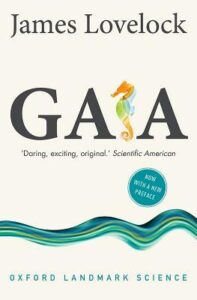 Gaia, James Lovelock
Gaia, James Lovelock
When I’ve heard of the Gaia theory before, I’ve usually heard of it in a sceptical sort of context that criticises the tree-hugging idea that Earth has a soul. That is not actually the main thrust of Lovelock’s argument at all: instead, what he argues is that Gaia, or Earth, is a self-sustaining system with in-built feedback loops which hold it more or less steady and capable of supporting life.
If you’ve studied climate or geology or even the water cycle, you know that he’s not wrong about the self-sustaining system. There’s so many negative feedback loops which keep things in check — some of which are, of course, threatening to be sabotaged by the action of one particular upstart mammal species with delusions of grandeur. We’re a part of the system, of course, but one which may have got out of hand. Or maybe not; maybe our intelligence will help rein us back in. We can only hope.
The point is, Lovelock’s not saying anything about a cosy loving Earth Mother spirit watching over us. Though his language in this book is sometimes poetical, and his sense of wonder at nature is clear, he’s talking about self-regulating, self-sustaining systems. He’s talking about the fact that the world has checks and balances in place which bring Earth into equilibrium, even though other factors — like the sun’s energy output — have changed over time. And okay, at some points he goes off on a tangent about whale intelligence and a hypothetical future in which whale brains give us technological advances, but the science here isn’t wrong.
There’s nothing actually revolutionary or tree-hugging here. It’s just true. Call it Gaia or call it a complex set of feedback loops; whatever you’re comfortable with, I guess. I do wish I’d read Revenge of Gaia instead, since this is horribly optimistic that humans will pull our collective fingers out and stop damaging the planet. I suspect Lovelock’s less sanguine about that prospect now.
Rating: 4/5
Tags: book reviews, books, non-fiction, science
Posted March 24, 2017 by Nicky in Reviews / 2 Comments
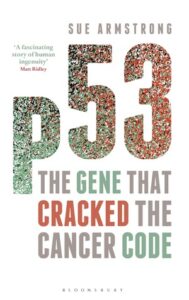 p53: The Gene that Cracked the Cancer Code, Sue Armstrong
p53: The Gene that Cracked the Cancer Code, Sue Armstrong
This is a good survey of the study of the p53 gene: one gene which turns out to have quite a bit influence on whether or not cancer develops in the body. It features some science, some history, some characters, and generally clear explanations of exactly how the science all works. It’s evident that it’s written by a journalist and not an expert, but that’s usually the perfect level for a casual reader anyway.
Now, if you don’t find cancer and how it progresses interesting, this will probably be lost on you. But if you have any interest, the background covered here is quite important to understanding cancer as a disease. It covers stuff like the “two hits” theory, why some children can be born with cancer, etc, etc. Enjoyable might be the wrong word for it, but I found it easy to read and informative.
Rating: 4/5
Tags: book reviews, books, non-fiction, science
Posted March 22, 2017 by Nicky in Reviews / 0 Comments
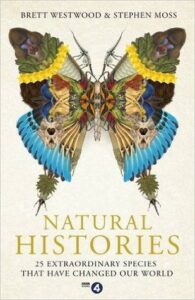 Natural Histories, Brett Westwood, Stephen Moss
Natural Histories, Brett Westwood, Stephen Moss
If you’re pretty well versed in natural history and biology, this book won’t hold many surprises for you — though it might have a few titbits you’re unaware of. It’s certainly very readable, and the cover design is pretty darn awesome. And slightly creepy, in that way which things of nature can be. (I mean, have you ever seen a rabbit’s skull? Erk.)
It might be more enjoyable if read alongside or as a recap for the radio programme it was based on. As it is, it seems to hop around the animal kingdom rather randomly.
This may sound like damning with faint praise, but it’s just that the book isn’t really a good fit for me. And it did hold a few surprises.
Rating: 3/5
Tags: book reviews, books, non-fiction, science
Posted March 16, 2017 by Nicky in Reviews / 0 Comments
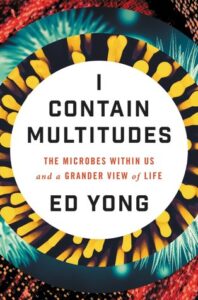 I Contain Multitudes, Ed Yong
I Contain Multitudes, Ed Yong
If you’ve already read books like Martin Blaser’s Missing Microbes, a lot of this info won’t be new to you. However, Ed Yong’s enthusiasm and wider range — dipping into the microbes of other animals and even insects — is a joy. He also provides a counterpoint to some of Blaser’s more hysterical ideas about the loss of microbes. He agrees that microbes are important, and that our relationships with them are complex. But he doesn’t accept that we’re totally doomed. There’s tons of research into repopulating our guts with beneficial microbes, prebiotics and probiotics. No doubt things are in the pipeline which will make a difference.
Yong is significantly less hopeful about the potential of procedures like faecal transplants — though the results have been encouraging in cases of C. difficile infections, the potential for treating inflammatory bowel disease seems more limited. It’s not impossible that a refined version of faecal transplants can help to rebalance the irritated and inflamed gut systems of people who suffer from inflammatory bowel diseases… but so far, the data isn’t there.
With his enthusiasm and interest, Yong makes me want to hurry the heck up, get my biology degree, and get stuck into researching on exactly these topics. One thing is for sure: our microbiome is incredibly important, and we need more research. Our gut microbes can affect our overall health in so many ways — mental health included — that I foresee a lot more time being spent on this in labs in the near future. And I hope I’ll be one of the people working in one of those labs.
If you don’t know much about microbes, fear not: Yong’s writing is clear and accessible, with no technobabble. I think this book would be totally accessible to anyone with an interest.
Rating: 4/5
Tags: book reviews, books, non-fiction, science
Posted March 8, 2017 by Nicky in Reviews / 6 Comments
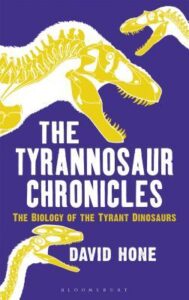 The Tyrannosaur Chronicles, David Hone
The Tyrannosaur Chronicles, David Hone
The Tyrannosaur Chronicles is a pretty entertaining survey of everything we currently know about tyrannosaurs — not just T. rex, but the related tyrannosaurs. That means it includes dinosaurs we don’t always think of as tyrannosaurs, but which are classified as types of tyrannosaur because of their close relationship to T. rex. The book is upfront about the fact that the information in it is going to be out of date before long — though not, I think, from the perspective of a layperson.
A lot of the info is stuff you may well already know, like the fact that T. rex was most likely feathered. But this book discusses it in detail, going into parts that were likely to be feathered, where the tyrannosaurs might have been scaled as traditionally depicted, etc. There are various different cases where there are theories about the tyrannosaurs that can’t be proven one way or another, and this book goes into them in detail. It discusses the evidence and findings, bringing them together into an entertaining and informative package of pure tyrannosaur-related awesomeness. It never got too dry or anything; I found all of it interesting and relevant.
Like all the best dinosaur books, it made me want to run out and become a palaeontologist, somehow. And it also made me crave overviews of other dinosaurs — can I have a book like this about the sauropods, now? Please?
Rating: 5/5
Tags: book reviews, books, non-fiction, science
Posted March 3, 2017 by Nicky in Reviews / 0 Comments
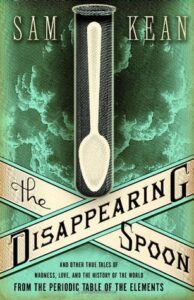 The Disappearing Spoon, Sam Kean
The Disappearing Spoon, Sam Kean
The Disappearing Spoon is not quite as entertaining to me as Sam Kean’s book on neuroscience, but it’s still reasonably fun and definitely an easy read. There’s all kinds of random facts, and he makes things like electron shells very clear — even for me, with my brain’s stubborn refusal to grasp it all. He writes with humour and enthusiasm, pulling out interesting characters and discoveries from the history of the Periodic Table and its elements.
I’m just not as into chemistry/physics as I am biology. Even organic chemistry. I should be, but, alas. So I found that this dragged a bit — for me. It’d probably be unfair to assume it’d drag for you as well, if you’re actually a fan of chemistry.
Rating: 3/5
Tags: book reviews, books, non-fiction, science
Posted February 23, 2017 by Nicky in Reviews / 5 Comments
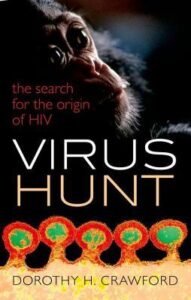 Virus Hunt, Dorothy H. Crawford
Virus Hunt, Dorothy H. Crawford
It’s been a little too long since I read this for me to review it effectively, but I definitely found it a fascinating read. Not only does it go into the various theories of how AIDs hopped between primates and humans, but it goes into the evidence for that in terms of the different strains of HIV — and their virulence in humans. There’s a lot of data here, and I think it could be overwhelming for someone who isn’t that interesting, but I found it fascinating.
If you’re looking for a social history of the disease, this isn’t where you want to look, though. It’s very much about the virology: tracking down the point of zoonosis, and figuring out how the various SIVs are related to our HIVs. It even illuminates the fact that there are various strains of HIV in the human population, something I didn’t actually know — I was under the impression that HIV jumped to humans once, and that one strain spread widely. Instead, there are actually some differing strains, with differing degrees of virulence.
All in all, pretty darn fascinating, as long as you’re ready for a wild epidemiological ride. Makes a very good supplement to the less technical view of David Quammen’s Spillover and the way it covered HIV.
Rating: 4/5
Tags: book reviews, books, non-fiction, science
Posted February 5, 2017 by Nicky in Reviews / 0 Comments
 One Plus One Equals One, John Archibald
One Plus One Equals One, John Archibald
The origin of complex life is endlessly fascinating, and various evolutionary innovations made it possible. This book covers an extraordinarily important moment: symbiosis between existing cells which produced the organelles on which most cells rely. We wouldn’t get far without mitochondria producing ATP for us. And yet it’s been clear to me for a long time that mitochondria had a separate origin. Some of the DNA in our cells exists solely within our mitochondria. That DNA doesn’t even obey the same rules as the rest of our DNA when it comes to producing gametes.
For me, then, this book took something incredibly obvious and broke it down into more steps than I needed. It works to convince you that symbiosis could have occurred. But to me, that’s immediately apparent from the fact that some of our organelles have clear extra-cellular origins. So that aspect of the book was quite slow for me. It’s interesting to read about the research and the people who proposed the theory anyway, though. If you’re into biology and you don’t already know/accept that mitochondria were once free-living bacteria, this is interesting and illuminating!
On a related note (not addressed within the book), it makes me wonder… How do people who don’t believe in evolution handle the existence of mitochondria? They pretty clearly show evolution and co-evolution occurred in the genesis of complex life. If mitochondria weren’t free-living bacteria that adapted to living within simple cells, why do they have their own genetic material? Did God leave it in by accident?
Don’t answer that.
Rating: 3/5
Tags: book reviews, books, non-fiction, science
Posted December 28, 2016 by Nicky in Reviews / 0 Comments
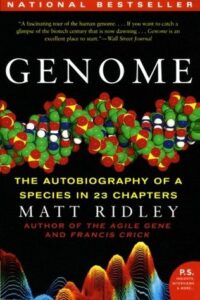 Genome: the Autobiography of a Species in 23 Chapters, Matt Ridley
Genome: the Autobiography of a Species in 23 Chapters, Matt Ridley
Genome is somewhat out of date by now, published back in 1999. Bearing that in mind, it was a pretty good read; sometimes, the themes Ridley chose for a particular chapter weren’t all that closely tied to the chromosome he chose, and issues like that, but that’s the problem with our chromosomes. The information isn’t distributed neatly across our chromosomes: in fact, those of us with a Y chromosome have one that does almost nothing overall, despite the fact that it affects carriers’ phenotypes so markedly.
It’s mostly informative and tries hard to avoid reinforcing certain misconceptions — like the idea that a gene codes for a disease, or that things are as simple as a single gene coding for a single trait. A lot of the anecdotes are familiar to me from previous reading, but it’s still interesting to see them presented in this way. It’s pretty modern-human-centric: I mean, if you’re going to look at our autobiography of a species, then I think at least a little time needs to be given to the past of our species. People so often want to know how closely we’re related to Neanderthals.
I think Ridley’s tone is a little dry, though; given that and the fact that the book is a little out of date now, I probably wouldn’t recommend it to anyone looking for a quick and up to date whip around of what we know of genetics. If you have a more general, patient interest, though, why not?
Rating: 3/5
Tags: book reviews, books, non-fiction, science
Posted December 19, 2016 by Nicky in Reviews / 2 Comments
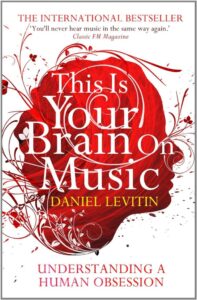 This Is Your Brain on Music, Daniel Levitin
This Is Your Brain on Music, Daniel Levitin
Despite loving singing, and having been good enough to perform and not have people run away, I know very little about music. Not that Levitin would be a snob about that, from the sound of this book, but it still forms a bit of a barrier to understanding when someone starts talking about semitones. I can sing C on demand, and I know when something is out of tune — what more do you want? (Although unlike most people, I have a bad sense of timing, apparently: I routinely sing slower than the original version of anything I’m performing. Most people apparently preserve the timing of the version they know best. Trivia!)
So anyway, the music side of this passed me by, mostly, despite the primer in the opening chapters. But the neuroscience behind music is fascinating, and Levitin explains it well. There are a few sections which drag as he spends too long explaining things, but on the other hand he references a wide selection of music, applying what he’s talking about to songs people often know. (Which again led me to wishing I knew more music, but this time popular music — I think I got one out of every five references? And my acquaintance with Bowie is pretty darn recent.)
I feel like the best people to appreciate this have a bit more music theory and a bit less neuroscience in their background, but nonetheless, I found it an intriguing read.
Rating: 3/5
Tags: book reviews, books, non-fiction, science
 Gaia, James Lovelock
Gaia, James Lovelock








